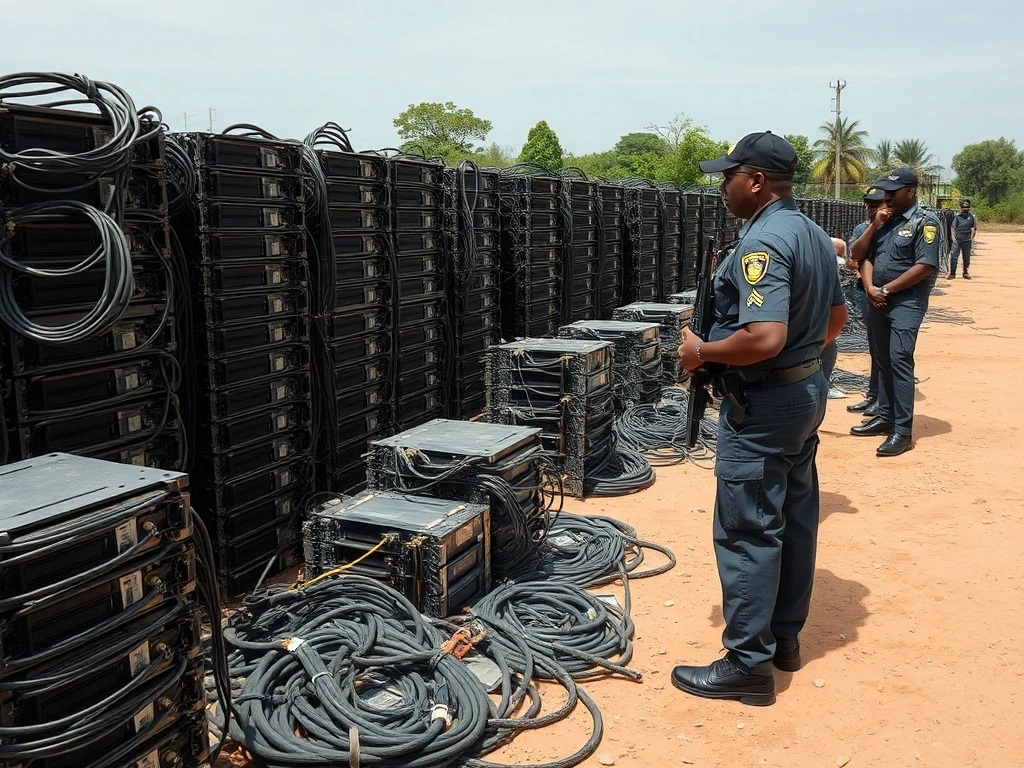Angola’s Massive Crypto Mining Crackdown: Interpol Seizes $100 Million in Global Cybercrime Operations

The world of digital assets constantly evolves, bringing both innovation and regulatory challenges. Recently, a significant event sent ripples through the cryptocurrency community: a massive **Interpol crackdown** on illegal **crypto mining** operations in Angola. This coordinated effort highlights the growing global scrutiny on illicit activities within the digital asset space and the increasing pressure on resource-intensive operations.
Interpol Leads Extensive Cybercrime Operations in Africa
The International Criminal Police Organization, widely known as Interpol, recently announced a significant achievement in its fight against cybercrime. This included a broad operation across African countries. In fact, authorities made more than a thousand arrests. Furthermore, they seized approximately $100 million in assets, targeting various fraudsters and illegal cryptocurrency miners. This extensive action demonstrates a clear commitment to policing the digital frontier.
Specifically, Interpol coordinated closely with Angolan authorities. Together, they successfully dismantled 25 illegal **crypto mining** centers. These operations were run by 60 Chinese nationals. Importantly, the organization reported seizing equipment valued at over $37 million. The Angolan government plans to distribute this confiscated equipment to vulnerable areas, aiming to benefit local communities directly.
The wider cybercrime operation across African nations proved highly effective. It resulted in the arrest of 1,209 individuals. Moreover, authorities recovered more than $97 million in illicit gains. A notable success also occurred in Zambia, where authorities dismantled a massive fraud scheme. In this particular case, 65,000 victims collectively lost around $300 million. They had been lured by promises of impossibly high-yield returns on their crypto investments. This underscores the diverse nature of digital asset-related crimes.
Angola’s Stance on Crypto Mining and Energy Consumption
Angola, a nation of about 39 million people, grapples with significant challenges regarding power distribution and supply. Many areas of the country face intermittent or unreliable electricity. Consequently, this critical infrastructure issue directly led to the recent **Angola crypto mining crackdown**. While the use of digital assets themselves is generally not illegal within Angola, the government implemented a mining ban in April 2024. This ban directly addresses the substantial **energy consumption** associated with cryptocurrency mining.
The Angolan law is quite clear and stringent. It explicitly criminalizes cryptocurrency mining activities. Possession of infrastructure and equipment used for virtual currency mining is also punishable. Offenders face one to five years’ imprisonment. Additionally, their equipment is subject to confiscation. The Chinese embassy in Angola issued a warning to its residents in April 2024, translating the notice to ensure clarity on the new ban. This swift regulatory action highlights the severity of the country’s energy concerns.
Global Responses to Crypto Mining Energy Consumption
Angola is certainly not alone in its concerns over the **energy consumption** of crypto mining. Many countries globally have introduced laws or policies to restrict or even outright ban such operations. These actions often stem from worries about power distribution to their citizens and the environmental impact. For instance, recent crackdowns include Russia’s Republic of Buryatia. There, authorities discovered 95 mining rigs and a mobile transformer hidden inside a truck, illegally siphoning electricity. Such incidents illustrate the global nature of this problem.
The United States presents a varied landscape for crypto miners. Laws and regulations are determined at the state level. This leads to certain states becoming ‘friendly’ to mining operations. Texas, for example, has attracted major players like MARA Holdings, Riot Platforms, and CleanSpark. These companies benefit from the state’s deregulated energy market and pro-business environment. In contrast, New York’s government implemented a two-year moratorium on proof-of-work mining in 2022. This decision reflected environmental concerns and the strain on local power grids. The diverse regulatory approaches underscore the ongoing debate surrounding crypto mining’s role in national energy strategies.
The Impact of the Interpol Crackdown on the Crypto Industry
The **Interpol crackdown** in Angola carries significant implications for the broader cryptocurrency industry. Firstly, it reinforces the message that illegal mining operations will face severe consequences. This is particularly true in regions struggling with energy resources. Secondly, it highlights the importance of regulatory compliance for all participants in the crypto space. Legitimate mining operations must adhere to local laws and environmental standards to avoid similar fates.
Furthermore, these **cybercrime operations** emphasize the global nature of illicit activities. They also showcase the increasing sophistication of international law enforcement efforts. As digital assets become more mainstream, so too does the need for robust legal frameworks. These frameworks must govern their use, trade, and mining. This incident serves as a stark reminder for miners to operate transparently and within legal boundaries. It also encourages nations to develop clearer guidelines for crypto-related activities.
Looking Ahead: Regulation and Responsible Crypto Mining
The recent events in Angola are a clear indicator of a global trend. Governments are increasingly scrutinizing the environmental and infrastructural impact of **crypto mining**. As a result, the industry must adapt. This adaptation involves prioritizing sustainable practices and engaging proactively with regulators. The future of mining will likely involve a greater emphasis on renewable energy sources and more efficient technologies. Furthermore, clearer international cooperation against **cybercrime operations** will be crucial.
For investors and enthusiasts, these crackdowns underscore the volatile nature of the crypto landscape. Regulatory changes can rapidly reshape market dynamics and operational feasibility. Consequently, staying informed about global policy developments is more critical than ever. The Angolan case demonstrates that while the allure of digital assets remains strong, adherence to national laws and responsible resource management will define the industry’s long-term success. This ongoing evolution demands vigilance and adaptability from all stakeholders.








